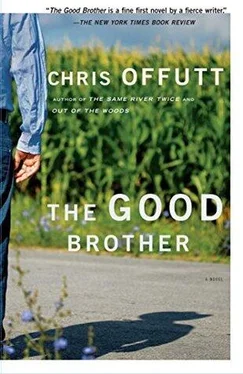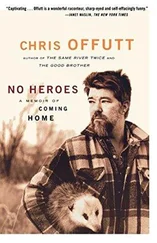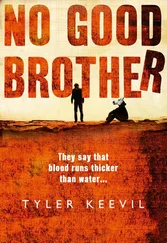“Hell, yes,” Phil said. “Got everything but girls and bars.”
Joe stopped the truck for a line of exhausted men who were trudging across the road toward tents. Their clothes were dirty, their faces smeared with dirt and ash.
“Great,” said Phil. “We’re just in time for shift change.”
“Is there a fire close?” Joe said.
“No, the helicopter drops them off. They got a landing zone down the road. A truck brings them here.”
“That’s the job you want,” Gerard said. “Transporting a crew. Nothing to it.”
At the supply area, Joe stood in the back of the truck and moved boxes to the edge, while Phil and Gerard stacked them on the ground. They finished, drove off the mountain, and ate lunch in the afternoon sun. Phil and Gerard passed a joint. Wind had temporarily cleared the smoke, and Joe lay on his back. The sky was dark blue overhead, like looking into water from the middle of a lake. He felt grateful for the patterns of work — rising early, performing a task, being an equal among men who worked. He appreciated the clear hierarchy of command and duty, the shared sense of responsibility. His presence was needed.
He returned to the ranch tired and happy. The children met him at the door, yelling his name, trying to climb his legs.
“How was it?” Botree said.
“A truck’s a truck,” Joe said. “I can drive anything.”
“You seem different already,”
“I like working. It makes me feel worth something.”
Joe felt lucky but was afraid to say it and risk hexing what little he had. After supper he lay in bed and read to Dallas and Abilene. He woke disoriented, with Abilene’s foot against his face, and a pile of books on his stomach. Botree was asleep. He undressed, feeling the unfamiliar sensation of peace.
For the next two weeks, Joe transported provisions to various camps in the mountains. Thousands of acres were burning daily. Crude camps were hastily arranged, with men sleeping outside in government-issue yellow bags. Fire crews were arriving from around the country. The main camp became so vast that a plywood billboard was erected with, information for the firefighters — maps to the sites, lists of crews and their home, newspaper articles from hometown papers of many states.
One morning Johnny was waiting for Joe by the Jeep. He looked tired and skinny. He asked if he could ride with Joe to work.
“How’s the bunkhouse?” Joe said.
“It stinks. Cold at night and hot in the day. The pump’s broke so there’s no water. You wouldn’t believe what Owen calls food.”
“Botree told me. How’s Sally?”
Johnny slumped in his seat and stared through the window for several miles. The western sky held a haze of smoke. An eagle flew along the river as if it were a road.
“I got to get out of there,” Johnny said.
“How come?”
Johnny shrugged. He rolled the window down and the smell of smoke entered the cab.
“Look,” Joe said. “Come back and live in the house.”
“That’s not it.”
“Then what?”
“Can you get me on with the fires?” Johnny said.
“Driving?”
“I don’t have a damn license. But I’ll do anything else.”
“I’ll try.”
“I’m not going back to the bunkhouse.”
Johnny signed with a crew digging fire break, using a shovel twelve hours a day and sleeping at a camp in the mountains. Joe began a daylong trip to a fire camp near the Idaho border. The fires had spread to Canada and were continuing to jump east into Montana. Gerard and Phil packed socks in the cab to sell to the firefighters at a profit.
“You think that’s right?” Joe said.
“Why not?” Gerard said. “That’s what they need the most and the concessionaire runs out every week.”
“I mean making money off it.”
“You are, too,” Phil said. “We all are. Those guys can afford it. They get the best wage except for pilots.”
Joe recalled a government project in Kentucky known as the Happy Pappy program that was designed to employ fathers. One of the jobs was fighting forest fires. Joe knew several men who’d set fires in the woods, then waited near the government office to be hired.
“I used to know a boy back home,” Joe said. “He wanted to go fishing, but didn’t have no bait. Went up to his cousin’s house and asked did he have any. His cousin said no, but he told him where to dig for fishing worms. That boy, he dug all day long. Worked hisself like a borrowed mule. Never did get a worm. At dark he said to hell with it and went to the house. Next day, his cousin went outside and planted a garden where he’d dug.”
“Sounds like a bait fisherman,” Phil said.
“I can just see you two charging him good money for digging.”
“If he was a friend of yours,” Gerard said, “we might give him a break.”
The smoke became thicker as they neared the fire zone. By midafternoon, the air was dark as dusk. They passed a freshly bulldozed landing strip where several air tankers were being serviced, their huge tanks refilled with fire retardant. The base commander was a Blackfeet man with a powerful body. Joe knew him from other camps. He worked harder than men half his age, and never appeared to have had much sleep. He was always calm.
He dispatched two men to help Gerard and Phil unload the truck.
“Getting worse, ain’t it,” Joe said.
“We lost two men last night and I got four more burned in the hospital.”
“How come this year is so bad?”
“You want the official answer, or mine?”
“Yours.”
“Putting out too many little fires.”
“What do you mean?”
“A lot of people move out here and build in the woods. They start crying when it catches on fire, and we get sent to put them out. Used to, we let those little fires burn. The brush builds up in the timber and there’s more to bum when it ignites. That kept a big one like this from happening. But the new people got the money and the juice.”
“That’s the way it always is, ain’t it.”
“No real Montanan builds a fancy house in the woods. I got two men died trying to save million-dollar homes.”
He turned to spit and the desiccated earth sucked the moisture like a sponge.
After three eighteen-hour days, Joe took a day off. The next morning, he and Botree drank coffee in sunlight the color of sweet corn.
“Got a visit from Owen,” Botree said. “He wanted us to be ready to mobilize.”
“What’s that supposed to mean?”
“I don’t know exactly. Frank might have to move his camp because of the fires.”
“It’s not my fight.”
“He said he’s just keeping us informed.”
The boys ran around the house, their boots raising a trail of dust. Abilene grabbed Joe’s leg, Dallas pushed his brother, then took Joe’s hand.
“Why are mountains so close together?” Dallas said.
“That’s just how they grow, I guess,” Joe said.
“I know,” Dallas said. “The seeds were close together when they got planted.”
“That makes sense.”
“And rocks are seeds.”
The boys began hunting rocks to plant.
“You’re good for them,” Botree said.
“You know what Dallas said the other day? Said he had two heads — his forehead and his main head.”
“Sounds like you.”
“What do you mean?”
“There’s you that’s here now,” Botree said. “And there’s the other you that drifts away sometimes. Makes me wonder if we can ever have a normal life.”
“What do you call normal?” Joe said. “Your kids don’t go to school. Your neighbors think freedom of religion means picking which Christian church to go to. The main thing your family is worried about is keeping their guns, and they got enough to start a war already.”
Читать дальше












